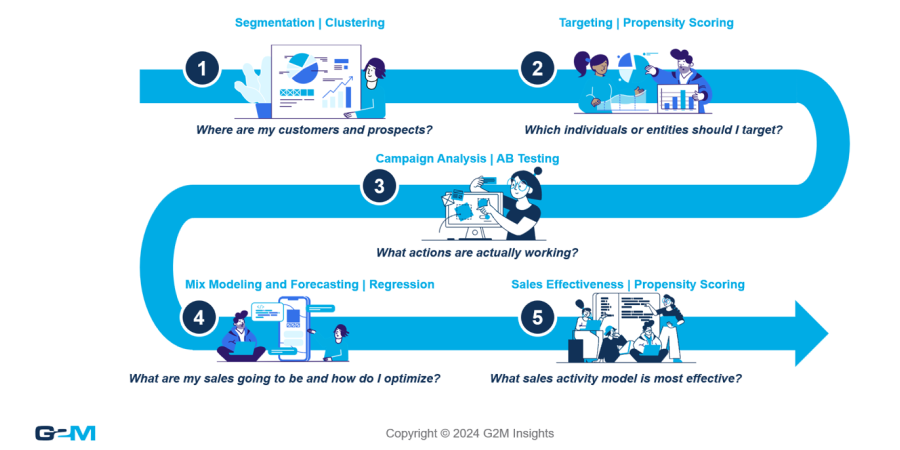
There’s a lot of hype today about gen AI and how it will change businesses. And we believe it will in a few years, just not today yet because the required infrastructure simply isn’t in the ground yet to operationalize gen AI at scale. Still, there’s a lot businesses can do today to capture tangible value with AI and machine learning, and a lot of it has to do with how you target and market to customers.
As pointed out by Gartner and others about 80% of the B2B buyer journey now occurs prior to ever talking to a sales rep. This means top performing organizations make it a strategic priority to identify, target, engage, and sell in a data- and technology-driven way by embedding AI across the customer journey. In this blog post, we’ll review five key AI use cases aligned with the typical B2B customer journey, highlighting how each adds tangible value today.

1. Segmentation and Clustering: Identifying Your Customers and Prospects
Understanding who your customers are forms the foundation of any effective marketing strategy. AI-driven segmentation and clustering enable businesses to categorize customers and prospects with precision, analyzing demographic, psychographic, and behavioral data through advanced machine learning algorithms. With modern AI-enabled tools companies can discover patterns and segments that are otherwise invisible, crafting personalized marketing strategies that resonate deeply with each distinct group.
How it Adds Value: AI in segmentation helps businesses tailor their outreach, enhancing the effectiveness of marketing initiatives and boosting customer satisfaction by delivering experiences that meet specific needs and preferences.
Where to Start: learn more about clustering here and check out our comprehensive guide on clustering models.
2. Targeting and Propensity Scoring: Pinpointing Who to Engage
After identifying the segments, the focus shifts to targeting. AI-driven targeting and propensity scoring assess past interactions and behavioral data to predict which prospects are most likely to engage. This sophisticated approach ensures that marketing efforts are concentrated on the most promising leads, maximizing conversion potential.
How it Adds Value: This use of AI conserves resources and amplifies marketing campaigns’ impact by focusing on leads with the highest engagement likelihood, significantly boosting conversion rates and optimizing marketing spend.
Where to Start: learn more about propensity scoring here and check out our comprehensive guide on propensity scoring models.
3. Campaign Analysis and A/B Testing: Measuring What Works
AI excels in dissecting the effectiveness of marketing strategies through comprehensive campaign analysis and A/B testing. By automating tests and analyzing results, AI enables real-time strategy adjustments, ensuring that enterprises are always leveraging the most effective approaches.
How it Adds Value: Continuous improvement of marketing tactics through AI-driven insights leads to higher campaign effectiveness, better customer engagement, and a deeper understanding of what resonates with audiences.
Where to Start: learn more about A/B testing here and check out our comprehensive guide on A/B testing.
4. Mix Modeling, Forecasting, and Regression: Predicting and Optimizing Sales
Forecasting future sales with accuracy is crucial for strategic planning. AI integrates historical sales data and external factors to not only forecast future trends but also reveal the impact of various marketing efforts, helping businesses allocate budgets more effectively.
How it Adds Value: Enhanced forecasting abilities allow for better inventory management, budget optimization, and strategic planning, reducing costs and facilitating smarter decision-making processes.
Where to Start: learn more about AI/ML impacts marketing analytics here and check out our tutorial on how to build a modern regression model.
5. Sales Effectiveness and Propensity Scoring: Enhancing Sales Strategies
AI analyses sales interactions and performance data to pinpoint the most effective sales tactics and predict customer responsiveness to upsells and cross-sells. This insight enables sales teams to customize their approaches, increasing efficiency and effectiveness.
How it Adds Value: Tailored sales strategies lead to higher conversion rates and improved customer relationships, ultimately driving revenue growth and enhancing the overall sales process.
Where to Start: learn more about data-driven selling here.
Conclusion
Adopting AI across the B2B customer journey is no longer a luxury but a necessity in today’s digital-first world. By implementing the AI-driven strategies outlined above, businesses can significantly enhance operational efficiencies and customer engagement, driving sustained growth. As your company looks to navigate and excel in this complex landscape, platforms like Analyzr from G2M Insights are essential, providing the tools and insights needed to leverage AI effectively and transform your business operations.
How can we help?
Feel free to check us out and start your free trial at https://analyzr.ai or contact us below!






